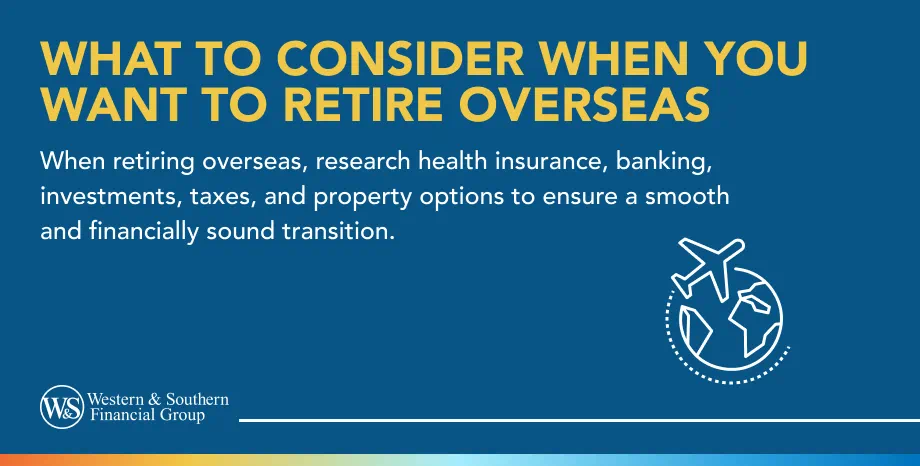

Table of Contents
Key Takeaways
- Plan health insurance and explore options like Medigap or local coverage.
- Manage finances with U.S. bank accounts, no-fee cards, and tax considerations.
- Choose renting or buying wisely and consult local experts.
For many Americans, the plan to retire overseas sounds incredibly appealing. Not only is it an adventure to live in another country, but you could also potentially stretch your budget by moving somewhere with a lower cost of living than the United States.
But before you pack your bags, make sure your retirement preparations are in order. Here's what to consider before you retire abroad.
Setting Up Health Insurance
Traditional Medicare typically does not cover health care expenses when you are in a foreign country. One option to look into is Medicare supplement insurance, also known as Medigap. Some of these plans cover international travel.1 You may also be able to buy a travel or international health insurance policy that's unrelated to Medicare.
If you move to a country with a national health care system, you might be able to qualify for their coverage, depending on your residency status. Check with local and national government sources to learn more about this option.
Handling Your Banking
As a U.S. citizen, it may be easier to keep money in an American bank and then make withdrawals from a foreign ATM to cover your day-to-day expenses. First, many U.S. banks have Federal Deposit Insurance Corporation (FDIC) insurance, which can help protect your money up to a limit, and may not be guaranteed in all foreign countries.2 The IRS also requires Americans with more than $10,000 in foreign bank accounts to file additional paperwork each year.3
To access your money without owing extra charges, you might be able to set up a U.S. account that waives international ATM fees on withdrawals, depending on the company you bank with. You could also set up an American credit card that does not charge international fees for your day-to-day spending.
Managing Investments
Investments like stocks and mutual funds may also be easier to manage in the U.S. Depending on the rules of the country in which you retire, you may not be eligible to open a brokerage account or qualify for the investment tax breaks that are available to citizens of that country. If you'd like more international investments in your portfolio, you could purchase international or global mutual funds sold by an American company instead.
Paying Taxes
When you receive taxable income from your retirement plans, Social Security, pension or U.S. based investments, you'll still owe taxes to the IRS as if you were living in the U.S. Depending on the country in which you choose to retire, you could also owe them taxes on that income as well. It can help to consult with a tax professional familiar with the country's local retirement planning laws to find out.
If you plan on working or investing after you retire overseas, you would owe taxes on that income to the foreign country. In addition, the IRS may tax that income, but only if you earn more than the Foreign Earned Income Exclusion, which is up to $126,500 per year in 2024, according to the IRS.4 That means you can earn up to this much in a foreign country without owing taxes to the IRS. Beyond this point, you may owe taxes to both countries.
Renting vs. Buying Property
When you first retire abroad, you'll need to decide whether to rent or buy a home. Renting can give you the flexibility to move more easily whenever you want, and as a foreigner, it may be more difficult to qualify for a mortgage. You'll also likely be less familiar with the market and ownership laws. Consider speaking with a trusted real estate professional in your new country of residence before you consider buying a home.
Moving overseas for retirement comes with extra hurdles, but they can be manageable. If it's your dream to live abroad in retirement, make sure to gather all the necessary information and review it thoroughly so you can continue along a financial path that suits you.
Sources
- Learn what Medigap Covers. https://www.medicare.gov/health-drug-plans/medigap/basics/coverage###.
- Understanding Deposit Insurance. https://www.fdic.gov/resources/deposit-insurance/understanding-deposit-insurance/index.html.
- Report of Foreign Bank and Financial Accounts (FBAR). https://www.irs.gov/businesses/small-businesses-self-employed/report-of-foreign-bank-and-financial-accounts-fbar.
- Figuring the foreign earned income exclusion. https://www.irs.gov/individuals/international-taxpayers/figuring-the-foreign-earned-income-exclusion.


